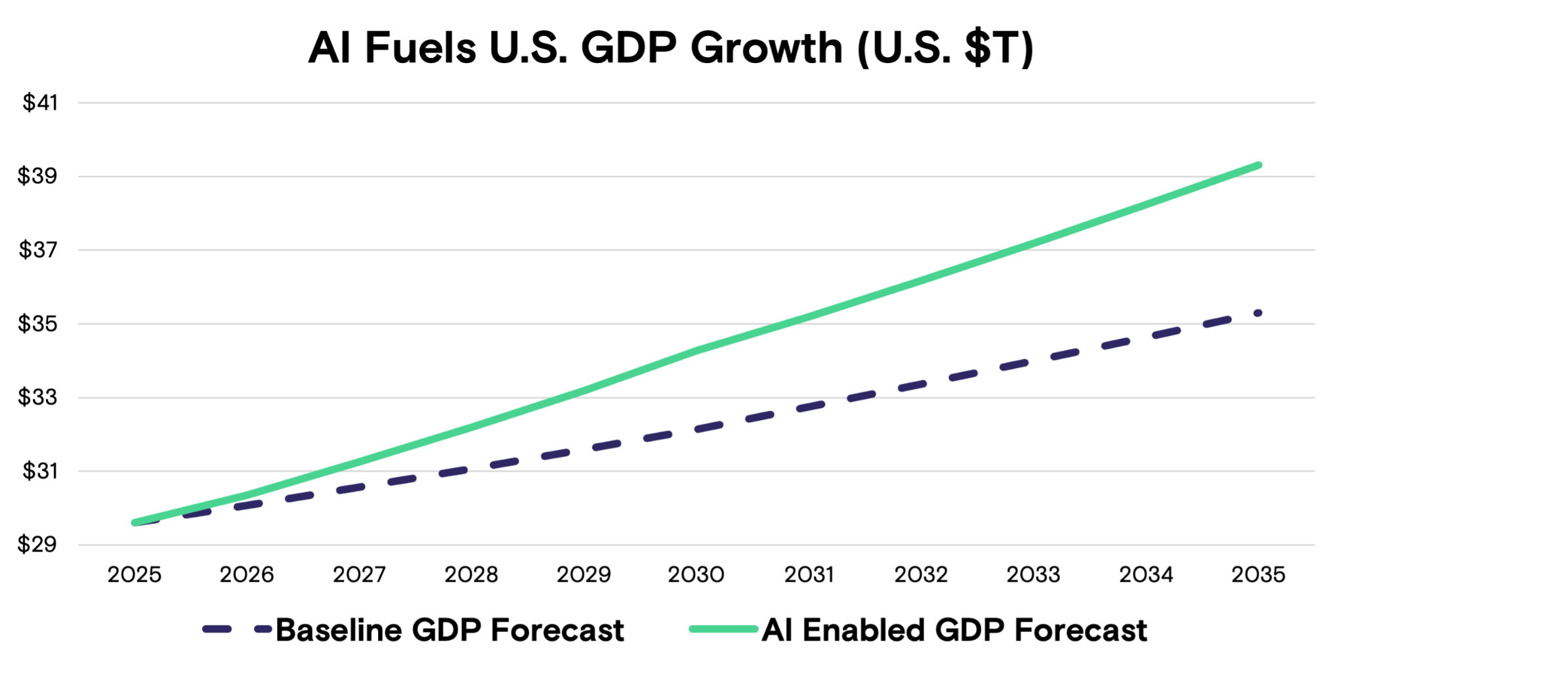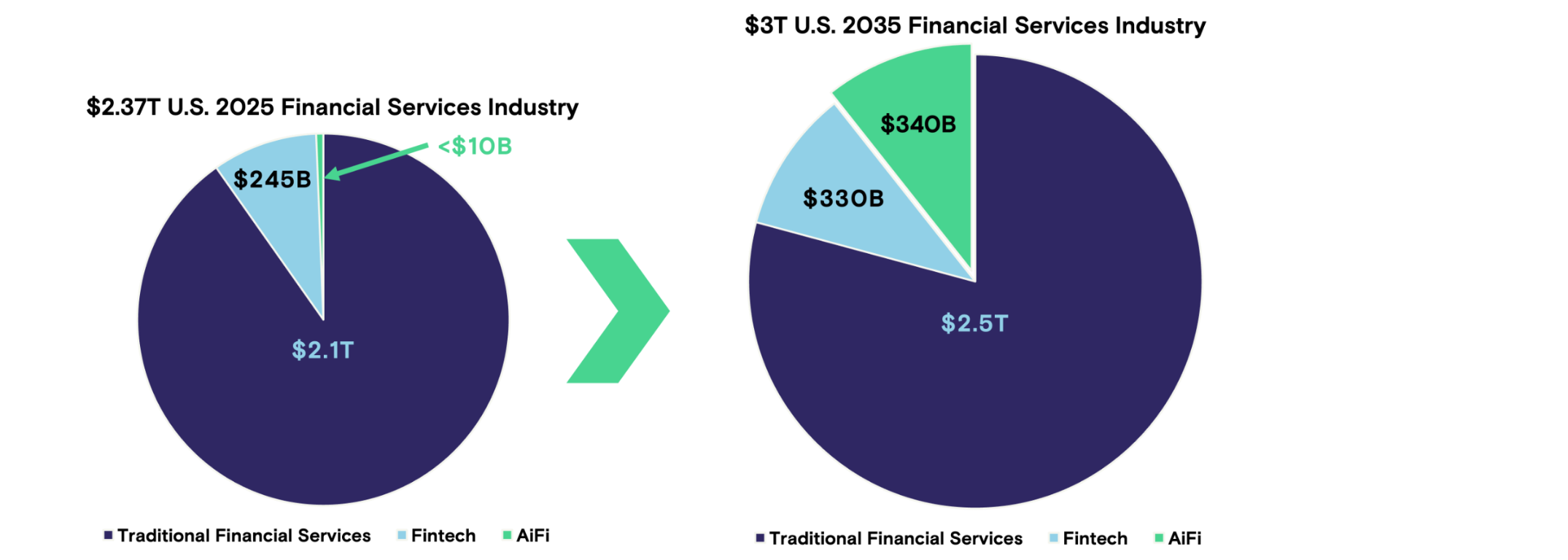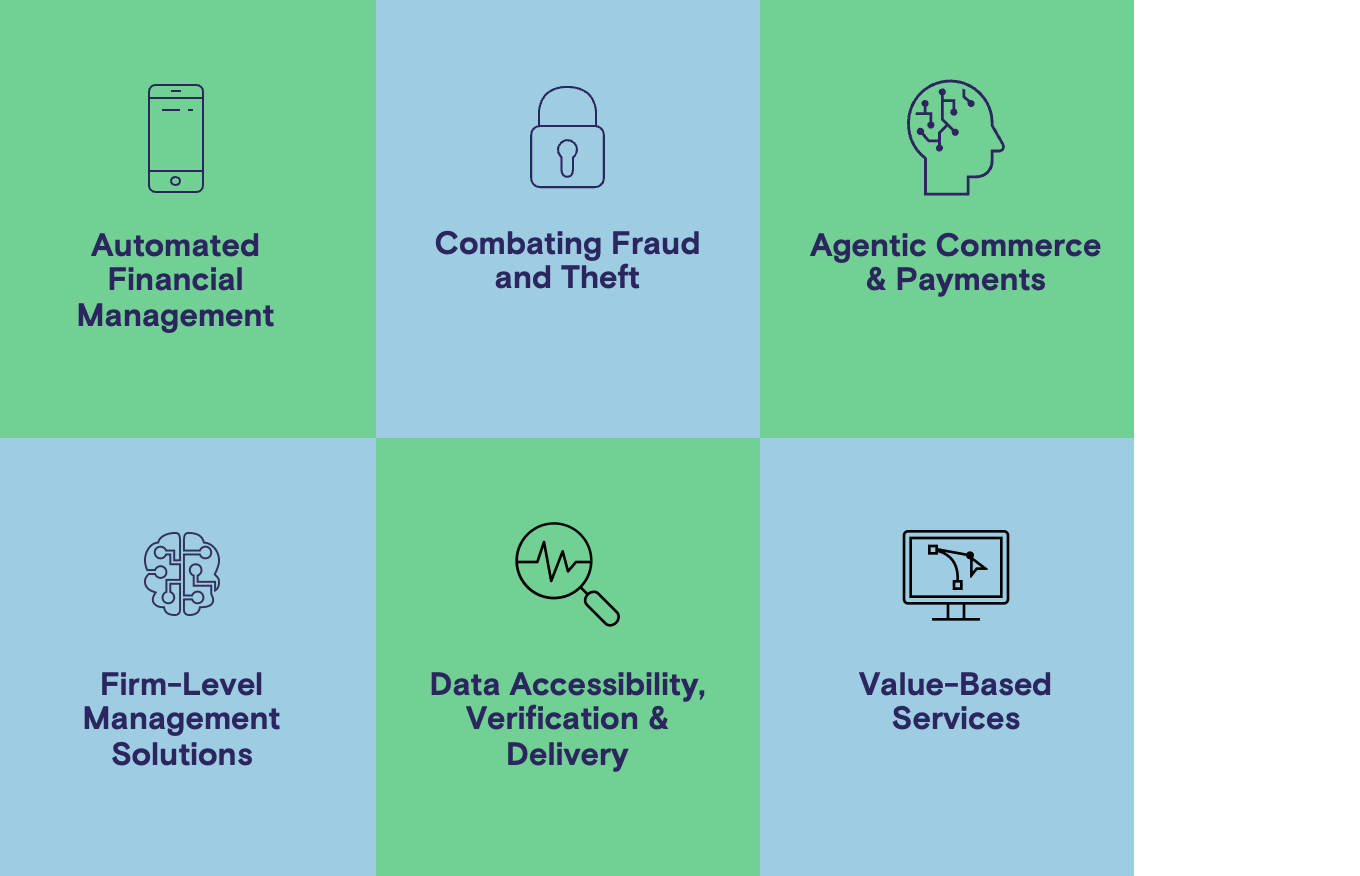
.png)
The Dawn of the AI Financial Services Industry
AI isn’t just a new technology. It’s increasingly looking like a socio-economic transition which is opening the aperture of what is possible in our economy. These transitions are extraordinarily rare, often happening just once in a generation – or less. They create remarkable, once-in-a-century opportunities for entrepreneurs and investors.
When these economic transitions have happened in history, they have also often led to the creation of entirely new financial infrastructure. For example, when nation states emerged, banks, and then capital markets, were developed to facilitate trade and investment. Similarly, the American economic (and democratic) expansion starting in the late 19th century created the payments and banking system we have today. Finally, Post-WWII globalization necessitated the creation of global capital markets and the dramatic expansion of the asset management industry – of which the venture capital industry itself was just a tiny part.
AI is set to dramatically expand global economic activity. In doing so it will fuel demand for financial services while catalyzing the development of new tools, systems and products. A new financial services industry is being built to meet these needs: AI Financial Services, or AiFi.
AiFi Services Will Be Big
AI is expected to boost global GDP by 6–15% over the next decade. Whether you believe Goldman Sachs’ 15% estimate or the OECD’s more conservative 6% bump, the consensus is clear: AI will unlock enormous economic growth. (Goldman Sachs, PWC, OECD)
This acceleration is driven by a combination of productivity gains as we use AI to do more at a lower cost, and from greater economic activity as people have more money to spend and invest. This expansion of economic activity means more payments, more demand for credit, more risks to protect against, and more wealth to manage.

This new category of activity will be very large. AI is projected to add over $4T to the U.S. GDP in the next decade alone, and over $15T globally. If AiFi captures just 8% of the value generated by AI, in line with the 8% of GDP captured by the financial services sector today, this new market could grow to a $340B/year industry in the U.S. by 2035, and over $1 trillion globally. That is significantly larger than the current size of today’s entire fintech industry. (BCG)

AiFi is Already Here
This isn’t a distant vision of the future. This is here today, with firms already offering payment services to AI Agents and AI-powered commerce. We also have AI-powered financial services products, such as credit, compliance and tax tools. These tools exist and more are coming, very quickly.
There is reason to believe that much of this new growth will continue to be driven by startups and new entrants. The first reason is that the incumbent financial services industry is also likely to continue to grow - so the competitive tradeoff for legacy businesses between investing in this new market versus investing in the existing markets will not be as stark as one might expect. In short, the incumbent firms may lack a strong near-term imperative to build these solutions.
The second reason is that many of the needs of an AI driven economy are not currently served by the financial services industry. We will need new tools and systems to support that growth. These tools will need to solve technology-driven problems so it stands to reason that firms with an advanced understanding of technology will develop the best solutions first.
This is a new market and it will support many new entrants
If history is any guide, the winners of AiFi will not be the incumbents. Economic expansions tend to expand the entire market for financial services, benefiting the fortunes of everyone in the market. As such, the existing core businesses of the incumbents often grow as new markets develop, limiting the necessity to invest in these new markets.
An analogy is the growth of banking in the American West. Wells Fargo, American Express, Western Union and, eventually, Bank of America were all new entrants, focused on serving a new and rapidly growing market. But the dominant New York banks of the time also did well by focusing on their own businesses closer to home. Those banks, like the Bank of Manhattan (now JPMorgan Chase) and City National Bank (now Citibank), were still extremely successful - benefiting both directly and indirectly from the growth of the economy in the Western United States. We saw similar patterns of financial services expansion after World War II when commerce and trade exploded globally dramatically expanding the size and scope of the global economy.
AI is creating a vast expanse of new economic opportunity; and will fuel another step change in the size and scope of the market.
So what is the vast expanse of new economic territory opened up by AI?
With near perfect information available to billions of people and businesses, the nature of commerce, trade, saving and investing will change. The changes unlocked by AI will enable new modes of economic activity, which AiFi will serve. The rise of intelligent agents, vast data accessibility, and machine-speed commerce will demand a rethinking of how we store value, make decisions, and interact economically. We have identified six major areas where the AiFi industry is starting to take shape, but expect many, many more to emerge.

Automated Financial Management
As AiFi becomes more capable, it will increasingly take over financial tasks including budgeting, bill payment, yield optimization, tax strategy, insurance shopping and real-time benefits enrollment. These systems won’t just suggest actions, they’ll execute them based on user permission. Many of the information asymmetries embedded in traditional financial products (often intentionally) can already be easily understood by free versions of today’s most popular LLMs. The next step is agents that can optimize an individual or businesses’ financial life proactively and continuously, rather than reactively, leading to significant improvements in the financial health of individuals and small businesses.
Combatting Fraud and Theft
Our current financial system relies heavily on identity verification and human-centered trust mechanisms. But AI systems can now generate realistic identities, documents, and behavioral patterns at scale. This makes traditional “know your customer” frameworks increasingly inadequate. This is a particularly challenging issue since we will want agents to engage in financial transactions on our behalf.
As such, AiFi will need to provide more robust, real-time systems to establish provenance, confirm delegated authority, and detect synthetic behavior across increasingly complex networks of agents. LLMs are already showing promise as evaluators of credibility, risk, and authenticity, and firms like Aembit are already building infrastructure to ensure that AI agents act securely and verifiably. These systems form the foundation of an always-on trust layer that can help enable secure agentic commerce at scale.
Agentic Commerce and Payments
Agents will transact, negotiate, and purchase on behalf of users and businesses. AiFi will provide the payments infrastructure where the agent is the actor and not just the facilitator. We’re already seeing this in early stablecoin wallets and programmable transaction systems, where permissions and smart contract logic govern behavior. Crossmint, a Restive portfolio company, supports stablecoin-powered solutions that enable agents to hold funds and transact on behalf of users. We expect AiFi to evolve toward dynamic payment rails that can support microtransactions, cross-agent escrow, permissioned fund flows, and even credit issuance. By making all of us better shoppers, agentic commerce will likely result in significant cost savings across the economy.
Firm-Level Management Solutions
Just as agents can manage a person’s financial life, they will increasingly be able to run entire firms. Not just by automating discrete workflows, such as bill payments or staffing, but by acting as autonomous business operators. AiFi systems can already coordinate inventory, vendor payments, payroll, compliance filings, and customer support. The next leap is integrated firm-level orchestration: AI “COOs” managing day-to-day operations and escalating only when human input is truly required. This won’t replace the firm but they will make them dramatically more efficient. While this may lead to labor displacement, it will also dramatically lower barriers to entry for new businesses, creating greater creativity in commerce, more consumer choice and more opportunities for new entrants.
Data Accessibility, Verification, and Delivery
AI is only as powerful as the data it can access and verify. In this new economy, AiFi infrastructure will also function as information infrastructure: delivering the right data to the right agent at the right time, with proof of authenticity. Verification layers – “whose data is this and what is it being used for?” – will be essential to allow agents to transact confidently and legally. This creates opportunities for new kinds of data clearinghouses, registries, and dynamic compliance engines.
Value-Based Services
Finally, as agents increasingly operate in a world of narrow margins and micro-optimizations, there will be immense value in services that interpret intent, optimize for values, and align incentives. We are already seeing this in AiFi solutions like SPRX’s R&D tax credit tool, which helps corporations manage and optimize R&D tax credits, and takes a cut of the savings. (SPRX is a Restive portfolio co.) As agents continue to move into higher value areas of the economy, we can expect AiFi to support economic models that better align incentives, provide guarantees on performance and indemnify against risks. AiFi will evolve financial services from passive intermediaries to value interpreters with products that encode and execute your preferences continuously.
AiFi will Unlock Even More Human Potential
The need for new use cases does not mean the existing economic system will cease to exist. Far from it. It’s likely to grow too. As economic opportunity abounds, the value of actual people to leverage their judgement, to take responsibility, and to interface with the agents on all of the edge cases that make up human existence will grow too. I do not think it is a coincidence that each of the previous economic transitions also coincided with the expansion of individual rights and economic opportunities: growing economic pies make all of us more important. And human judgement, creativity, and responsibility, will be the scarce resources in this new economic system.
We are on the verge of an incredible explosion of human potential, which will be made possible by a new industry: AiFi. The new system is being created out of whole cloth. And that is starting now.
If you're building for this exciting future, please reach out. We want to be your partner.
Special thanks to Chris Gottschalk for his insightful perspective on how AI will impact financial services, which was a major catalyst for my thinking. Most importantly, thank you to our founders for showing us this future.

© 2025 Restive®, Inc.